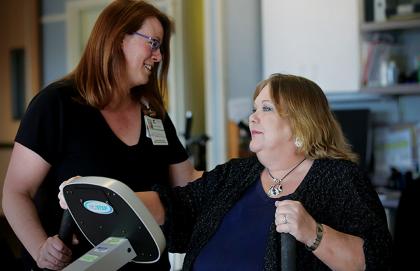Our neurology team diagnoses and treats problems with your brain, spinal cord, and nerves. From your spinal cord, nerves branch off to every part of your body. Your nervous system lets you feel sensation, like pain, but also regulates your heart rate, digestion, respiration and all the workings of your body.
If something goes wrong with a part of your nervous system, you can have trouble moving, breathing, speaking, swallowing, or learning. You can also have problems with your senses, memory, or mood.
If you think someone is experiencing a stroke, call 911 immediately. Learn how to tell if someone is having a stroke.
How we can help
We will work with you and other professionals on your team to design the best health care plan for you and your life. Your treatment plan may include care from other specialists at Cheshire Medical Center and Dartmouth Hitchcock Medical Center and Clinics Neurology Department.
These are some of the more common problems we treat:
- Alzheimer’s disease and other forms of dementia
- Amyotrophic lateral sclerosis (ALS or Lou Gehrig’s disease)
- Brain tumors or cancers that affect the nervous system
- Brain damage
- Brain dysfunction resulting from a variety of causes (encephalopathy)
- Epilepsy
- Head trauma
- Headaches, chronic or migraine
- Injuries to the spinal cord or brain
- Inflammation of the brain (encephalitis)
- Movement disorders including Parkinson’s disease
- Multiple sclerosis
- Muscular dystrophy
- Neck and back pain
- Neuropathy (or loss of feeling)
- Seizure disorders, like epilepsy
- Sleep disorders
- Stroke
For more information on a range of neurological disorders, visit the Dartmouth Hitchcock Medical Center and Clinics Neurological Treatments and Services page.
Comprehensive evaluations
If your primary care provider refers you to us for a comprehensive neurological evaluation, we talk about your symptoms and how they affect your life. Then we carefully and gently examine you and work with you on what steps to take next. We usually test motor and sensory skills, including your strength, coordination, and balance. We may also check our hearing, speech, vision, and memory.
Often, we use diagnostic testing results to help us diagnose your problem and create your personalized treatment plan. Some common tests are:
- Computerized tomography (CT) scan
- Electroencephalogram (EEG)
- Magnetic resonance imaging (MRI)
- Neuromuscular electrophysiology (EMG)
Your personalized treatment plan
Your unique plan of care depends on your diagnosis and needs. Treatment often includes medications or referrals to physical therapy, speech therapy, occupational therapy, and support groups. In special cases, surgery may be required by our expert partners at Dartmouth Hitchcock Medical Center.
Collaboration for the best care
Cheshire’s neurology team often coordinates with other experts as part of your personalized treatment plan. Whether your care is provided by other specialists at Cheshire or our colleagues at Dartmouth Hitchcock Medical Center, you can expect a seamless transition of care. All of your providers within the Dartmouth Health system coordinate your care with electronic records.
You or your designated family member can contact any of your providers, coordinate appointments, and more with the myDH patient portal.
Others included in your care plan may be:
- Diagnostic imaging for testing, diagnosing and managing neurological problems
- Inpatient physical rehabilitation for comprehensive rehabilitation therapy with the benefits of a hospital setting, including 24/7 rehabilitation nursing care and diagnostic capabilities
- Outpatient rehabilitation such as:
- Occupational therapy to help you perform activities of daily living
- Physical therapy to restore mobility and strength
- Speech therapy to improve communication and swallowing
- Specialized programs such as LVST BIG and LOUD, aquatic therapy, and industrial rehabilitation
- Physical medicine and rehabilitation for highly specialized treatment to improve function for some neurologic conditions
- Specialized neurology teams at Dartmouth Hitchcock Medical Center
- Support from telemedicine video conferencing with Dartmouth Hitchcock Medical Center neurologists in Cheshire’s Emergency Department and inpatient units.
- Your primary care team
